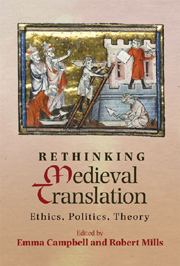Book contents
- Frontmatter
- Contents
- List of Illustrations
- List of Contributors
- Acknowledgements
- Introduction: Rethinking Medieval Translation
- 1 On Not Knowing Greek: Leonzio Pilatus's Rendition of the Iliad and the Translatio of Mediterranean Identities
- 2 Translation and Transformation in the Ovide moralisé
- 3 Translating Lucretia: Word, Image and ‘Ethical Non-Indifference’ in Simon de Hesdin's Translation of Valerius Maximus's Facta et dicta memorabilia
- 4 Translating Catharsis: Aristotle and Averroës, the Scholastics and the Basochiens
- 5 The Ethics of Translatio in Rutebeuf's Miracle de Théophile
- 6 Invisible Translation, Language Difference and the Scandal of Becket's Mother
- 7 Medieval Fixers: Politics of Interpreting in Western Historiography
- 8 The Task of the Dérimeur: Benjamin and Translation into Prose in Fifteenth-Century French Literature
- 9 The Translator as Interpretant: Passing in/on the Work of Ramon Llull
- 10 Rough Translation: Charles d'Orléans, Lydgate and Hoccleve
- 11 Bueve d'Hantone/Bovo d'Antona: Exile, Translation and the History of the Chanson de geste
- Untranslatable: A Response
- Bibliography
- Index
7 - Medieval Fixers: Politics of Interpreting in Western Historiography
Published online by Cambridge University Press: 05 April 2013
- Frontmatter
- Contents
- List of Illustrations
- List of Contributors
- Acknowledgements
- Introduction: Rethinking Medieval Translation
- 1 On Not Knowing Greek: Leonzio Pilatus's Rendition of the Iliad and the Translatio of Mediterranean Identities
- 2 Translation and Transformation in the Ovide moralisé
- 3 Translating Lucretia: Word, Image and ‘Ethical Non-Indifference’ in Simon de Hesdin's Translation of Valerius Maximus's Facta et dicta memorabilia
- 4 Translating Catharsis: Aristotle and Averroës, the Scholastics and the Basochiens
- 5 The Ethics of Translatio in Rutebeuf's Miracle de Théophile
- 6 Invisible Translation, Language Difference and the Scandal of Becket's Mother
- 7 Medieval Fixers: Politics of Interpreting in Western Historiography
- 8 The Task of the Dérimeur: Benjamin and Translation into Prose in Fifteenth-Century French Literature
- 9 The Translator as Interpretant: Passing in/on the Work of Ramon Llull
- 10 Rough Translation: Charles d'Orléans, Lydgate and Hoccleve
- 11 Bueve d'Hantone/Bovo d'Antona: Exile, Translation and the History of the Chanson de geste
- Untranslatable: A Response
- Bibliography
- Index
Summary
The focus of this chapter is the fixer, who plays a pivotal role in a number of Western medieval historiographies. A term I borrow from translation studies, ‘fixer’ has gained new currency since the beginning of the war conflict in Iraq (2003). In translation studies, ‘fixers’ are identified as performing a range of duties in addition to interpretation and/or translation, acting as local informants, guides, negotiators and more. While there is no easy synonym for this term of journalistic provenance, we can think of fixers as mediators, go-betweens endowed with multiple linguistic, social, cultural, topographic, etc., skills. Until Lawrence Venuti's The Translator's Invisibility and simultaneous explorations of legal, medical and military interpreting in the 1990s, interpreters were almost by definition stripped of their agency. Since then, researchers have not only acknowledged their agency in the translation process, but have also identified a host of conflictual issues which interpreters in war face and in relation to which they must negotiate their positions. Among the most important is the question of trust and credibility, but other issues also come up, such as ethics (the ethical conflict for an interpreter that arises when a code of professional ethics is contradicted by the political, military and social conditions on the ground and when the fixer is caught between two power differentials), and activism in the context of volunteer interpreting and translation.
- Type
- Chapter
- Information
- Rethinking Medieval TranslationEthics, Politics, Theory, pp. 147 - 163Publisher: Boydell & BrewerPrint publication year: 2012



